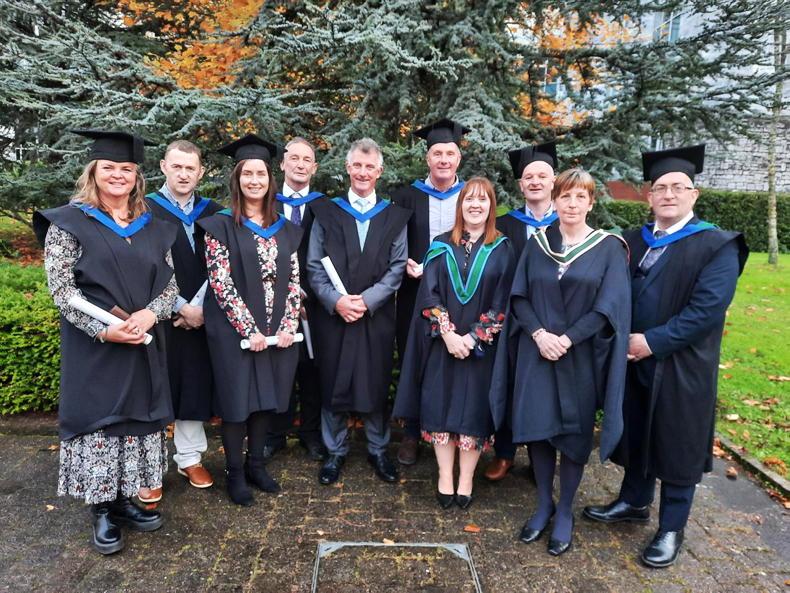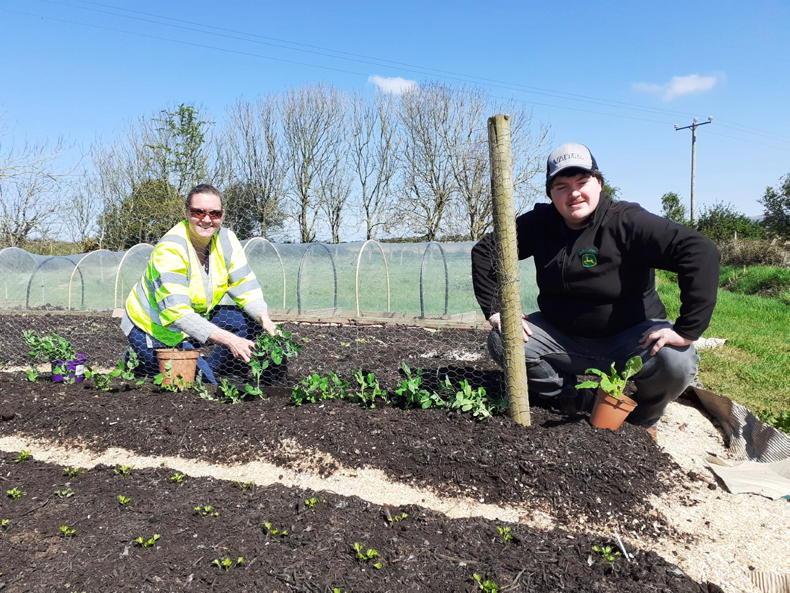Social farming is the use of therapeutic farming landscapes and practices on part or all of a working farm to provide health, social, educational and/or vocational supports to a small number of people at risk of social exclusion,” according to Kerry Social Farming.
People at risk of social exclusion include those with a disability, ill health, age, addiction or crime. Social farming schemes include activities involving livestock, horticulture, crops, machinery or woodland and takes place in a supervised and structured programme.
Social farming first took root in Ireland in 2007 and has grown steadily since then.
“We have gone from two social farms in the whole country to over 20 in a matter of years so it’s becoming a big growth area in Ireland,” says Eleanor McSherry, programme coordinator at University College Cork (UCC) Adult Continuing Education (ACE).

Social farming is not just a rewarding activity to those from disadvantaged backgrounds or with disabilities, it also is rewarding for the host farmer to introduce farming to urban dwellers
“It’s seen as a valid part of farming life, which is fantastic from a disability point of view,” she adds.
Increasingly popular in the Kerry region, Kerry Social Farming (KSF) was established in 2013, hence why this course was previously run at the Skellig Centre for Research and Innovation (CRI) in Cahersiveen in conjunction with KSF.
KSF is now collaborating with UCC and Skellig CRI in Cahersiveen to develop the National Framework of Qualifications (NFQ) level 6 certificate in Practice Support in Social Farming.
Billy Jo O’Connor, a previous course attendee, is now putting her course material into action as she opens up her farm to social farming. She runs a small organic fruit and vegetable farm and also keeps free-range chickens at Leagh farm in north Kerry.
“We have a participant, Patrick Barry, who attends St John of Gods, and he comes out to us one day a week to help on the farm doing bits and pieces,” she explains.
A neighbouring farmer was Billy Jo’s inspiration to do the course and get involved with the programme.
“I always saw the enjoyment she got from the days that she had participants – she has three people who come to her – it just opened my eyes to doing things a different way and the different types of personalities in the community,” she says.
During lockdown, Billy Jo was able to take part in the course as it was delivered online, which suited her busy family and work lifestyle.
“It gives you good tools to better understand your participant. One of the modules you do on the course is communication … wires can get crossed when you are talking to someone who has an intellectual disability, so they equip you with how best to give clear instructions and avoid crossed wires,” she explains. “The reason I wanted to do the course was to feel more confident as a social farmer.”
Who is this course aimed at?
“The course is aimed at any farmer who wants to set up a social farm,” says Eleanor McSherry. “Those are the primary people we are trying to get on this course but also people who are working in companies who are over the development of social farming in their region. We have also had one or two people interested from the agricultural colleges as well,” says Eleanor.
Can I apply?
To apply, applicants must be at least 21 years of age by 1 January of the year of application. While there are no formal educational requirements, it is expected that proposed candidates will have attained Leaving Certificate/FETAC Level 5 or an equivalent qualification.
Prior experience will be taken into account and short-listed candidates may be required to attend for an interview.

Recent graduates of the Social Farming certificate course at University College Cork.
All applicants whose first language is not English must have attained IELTS Level 6 or equivalent TOEFL score.
Eleanor encourages anyone who is looking to get involved to give it a go as social farming is rewarding for both the attendees and the farmer. It can also be rewarding for the host farmer to introduce farming to urban dwellers, to show them a different way of life, one that might even benefit them better than the environment they are currently living in.
Read more
Agri Careers Profile: Tadhg Buckley - AIB to IFA
One former mechanic helps to make European cities greener
Social farming is the use of therapeutic farming landscapes and practices on part or all of a working farm to provide health, social, educational and/or vocational supports to a small number of people at risk of social exclusion,” according to Kerry Social Farming.
People at risk of social exclusion include those with a disability, ill health, age, addiction or crime. Social farming schemes include activities involving livestock, horticulture, crops, machinery or woodland and takes place in a supervised and structured programme.
Social farming first took root in Ireland in 2007 and has grown steadily since then.
“We have gone from two social farms in the whole country to over 20 in a matter of years so it’s becoming a big growth area in Ireland,” says Eleanor McSherry, programme coordinator at University College Cork (UCC) Adult Continuing Education (ACE).

Social farming is not just a rewarding activity to those from disadvantaged backgrounds or with disabilities, it also is rewarding for the host farmer to introduce farming to urban dwellers
“It’s seen as a valid part of farming life, which is fantastic from a disability point of view,” she adds.
Increasingly popular in the Kerry region, Kerry Social Farming (KSF) was established in 2013, hence why this course was previously run at the Skellig Centre for Research and Innovation (CRI) in Cahersiveen in conjunction with KSF.
KSF is now collaborating with UCC and Skellig CRI in Cahersiveen to develop the National Framework of Qualifications (NFQ) level 6 certificate in Practice Support in Social Farming.
Billy Jo O’Connor, a previous course attendee, is now putting her course material into action as she opens up her farm to social farming. She runs a small organic fruit and vegetable farm and also keeps free-range chickens at Leagh farm in north Kerry.
“We have a participant, Patrick Barry, who attends St John of Gods, and he comes out to us one day a week to help on the farm doing bits and pieces,” she explains.
A neighbouring farmer was Billy Jo’s inspiration to do the course and get involved with the programme.
“I always saw the enjoyment she got from the days that she had participants – she has three people who come to her – it just opened my eyes to doing things a different way and the different types of personalities in the community,” she says.
During lockdown, Billy Jo was able to take part in the course as it was delivered online, which suited her busy family and work lifestyle.
“It gives you good tools to better understand your participant. One of the modules you do on the course is communication … wires can get crossed when you are talking to someone who has an intellectual disability, so they equip you with how best to give clear instructions and avoid crossed wires,” she explains. “The reason I wanted to do the course was to feel more confident as a social farmer.”
Who is this course aimed at?
“The course is aimed at any farmer who wants to set up a social farm,” says Eleanor McSherry. “Those are the primary people we are trying to get on this course but also people who are working in companies who are over the development of social farming in their region. We have also had one or two people interested from the agricultural colleges as well,” says Eleanor.
Can I apply?
To apply, applicants must be at least 21 years of age by 1 January of the year of application. While there are no formal educational requirements, it is expected that proposed candidates will have attained Leaving Certificate/FETAC Level 5 or an equivalent qualification.
Prior experience will be taken into account and short-listed candidates may be required to attend for an interview.

Recent graduates of the Social Farming certificate course at University College Cork.
All applicants whose first language is not English must have attained IELTS Level 6 or equivalent TOEFL score.
Eleanor encourages anyone who is looking to get involved to give it a go as social farming is rewarding for both the attendees and the farmer. It can also be rewarding for the host farmer to introduce farming to urban dwellers, to show them a different way of life, one that might even benefit them better than the environment they are currently living in.
Read more
Agri Careers Profile: Tadhg Buckley - AIB to IFA
One former mechanic helps to make European cities greener








 This is a subscriber-only article
This is a subscriber-only article










SHARING OPTIONS: